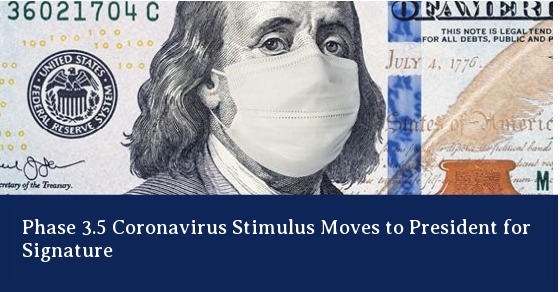The House of Representatives has passed the $484 billion legislation which will provide additional Covid-19 relief for small businesses, hospitals and expanded virus testing. Central to the relief package, referred to as “Phase 3.5 Coronavirus Stimulus” is additional funding for the Paycheck Protection Program which quickly ran out of money after the March 27th passage of the CARES Act. The Senate passed the bill on Tuesday and the President has announced he will sign the bill immediately upon receipt.
Key highlights of the bill are below:
Additional Funding for the Paycheck Protection Program (PPP)
An additional $310 billion has been authorized for the Paycheck Protection Program including $60 billion dedicated to underserved communities, community banks and credit unions in an effort to provide funding to minority and rural businesses.
The PPP was originally authorized under the Coronavirus Aid, Relief, and Economic Security (CARES) Act and was funded with $349 billion. It provides up to eight weeks of cash-flow assistance to eligible recipients to maintain payroll during the COVID-19 crisis and cover certain other expenses. Eligible recipients could qualify for loans up to $10 million calculated based on average monthly payroll costs x 2.5 and the first loan payment is deferred for six months. The loans could be forgiven if the company maintains its employee and salary levels, and if the proceeds are used to cover payroll costs and defined expenses including rent and utility costs. No more than 25% of the loan may be used for non-payroll expenses. Normally a reduction or cancellation of indebtedness generally results in cancellation of debt (COD) income to the debtor, however under the CARES act amounts forgiven under a PPP loan are excluded from the recipient’s federal gross income. Unforgiven amounts of the loans will have an interest rate of 1%, a maturity of two years, and no borrower or lender fees.
Additional Funding for the Economic Injury Disaster Loan program (EIDL)
An additional $60 billion has been authorized for the EIDL run by the Small Business Administration (SBA), $10 billion of of the funds is reserved for the EIDL Advance program, which provides up to $10,000 emergency grants and does not need to be repaid.
The SBA’s EIDL program, provides up to $2 million of financial assistance to eligible small businesses or private, non-profit organizations that suffer substantial economic injury as a direct result of the declared disaster. The EIDL is a low-interest working capital loan at a fixed rate of 3.75% for businesses and 2.75% for nonprofits, with a term of up to 30 years. The repayment term will be determined by the applicants ability to repay the loan. Payments are deferred for one year, and borrowers don’t have to prove they cannot get credit elsewhere. Applicants do not go through a bank to apply, and instead, apply directly to the SBA. Loan amounts are based on the amount of economic injury and loans under $25,000 can be unsecured.
Additional Health care provider relief
An additional $75 billion has been authorized for the Public Health and Social Services Emergency Fund, to be distributed to hospitals and health care providers for related expenses or lost revenue attributable to the coronavirus. The bill supplements the $100 billion provided through the CARES Act, of which $30 billion has already been allocated based on providers’ share of 2019 Medicare fee-for-service (FFS) billing.
Funding for COVID-19 testing
The bill authorizes $25 billion for the Public Health and Social Services Emergency Fund for necessary expenses to research, develop, validate, manufacture, purchase, administer, and expand capacity for COVID-19 tests.



